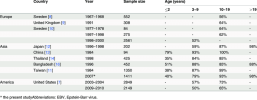Hello everyone! I am a long time lurker of the forum, so I feel like I should contribute a little. Here is the draft of the first factsheet.
甚麼是ME/CFS?
重點
病徵
在體力活動或思維活動後病情加劇是ME/CFS的關鍵症狀。患有ME/CFS的人能量有限,做了太多的活動會使他們的症狀變差。這現象可以在數小時或數日後發生,且需要一段長時間來恢復。休息或睡眠對此的緩解作用不大。這被稱作 活動後不適 post-exertional malaise (PEM)。
ME/CFS的疲憊與一般的疲勞或睡意不同。它是種具壓倒性的疲憊,足以令人無法過正常的生活。其他常見的症狀有:像感冒般的感覺、睡眠問題、腸胃問題、痛症,以及在思維、記憶、或注意力方面的困難。
很多患者對正常水平的音量、光亮度、氣味或觸覺不耐受;這些一切都可以使病人更加病。大部分患者會越長時間直立或坐直後,身體越來越不舒服。這被稱作 直立不耐症。很多人因此需要在大多數時間保持平躺、或腳腿抬起的姿勢。
ME/CFS病人看上去可能並沒有病容,但他們在很多方面都有嚴重的障礙。這個病令人難以,甚至不可能去工作、求學、保持社交活動、或做家務。有部分人會因病局部地或完全地不能離家。而ME/CFS最嚴重的患者會卧床不起,生活不能自理,會需要在如清潔、如厠或穿着上的幫助。因為他們很多不能耐受任何光線或聲音,他們需要躺臥在全黑、無聲的房間裏休息。其中一些還會有進食上的問題,罕見情況下需要導管餵飼。
誰會患上ME/CFS
在任何時期都會有大約250分之1的人受患。ME/CFS會影響小童及成人,包括老年人。所有社會階層以及族裔的人士均會受影響。
被確診ME/CFS的患者大約四分之三是女性。這個病在青春期之前比較少見。有些家庭有多過一位成員罹患ME/CFS,但研究人員目前尚未發現連繫此病的基因。
ME/CFS通常在例如傳染性單核白血球增多症或新冠病毒病等感染後發病。
診斷
ME/CFS的成因與病理機制在目前尚不明朗。現時並沒有可以用以確診的化驗測試。醫生會根據臨床表現作診斷,但這些症狀必需嚴重到影響日常生活,且持續數月或更長時間。醫生會為病人安排體檢和化驗,以排除那些症狀表現與ME/CFS相近的其他疾病。
治療
目前沒用任何可以根治或有效治療ME/CFS的療法。一般會針對單獨症狀處理,例如睡眠問題或痛症等。許多ME/CFS患者發現,調整活動節奏 (pacing),將精力消耗控制在他們的能量範圍內,對於避免活動後不適有一定作用。
有一些以復健角度試圖治療ME/CFS的方法,會鼓勵患者隨時間逐漸增加活動量,其目的是希望可以幫助他們恢復正常活動水平。其中一種名為 分級運動療法 (graded exercise therapy) 的治療方式已被廣泛研究,但並未顯示有效。一些大型問卷調查表明,許多受訪患者在接受該療法後病情大幅惡化。目前沒有證據顯示該療法的其他變體,如 ‘graded activity’ 或 ‘pacing up’,是有效或安全的。有些醫學指南反對采用這類療法。
認知行為療法 (cognitive behavioural therapy) 旨在改變人的行為及思維模式。它有時被用於治療ME/CFS,但研究沒有表明這種方式對改善疾病本身有何用處。
病程及預後
ME/CFS可突然出現,亦可續漸發展。症狀的種類與嚴重程度通常會隨時間演變。
長期來說,有些人會轉好,有些維持現狀,也有些會惡化。除青少年、小童、以及病發早期的人外,完全康復的情況比較少有。對大多數患者來說,ME/CFS是個長期疾病。
參考文獻 (these are just the headers for the reference section)
病徵
誰會患上ME/CFS
診斷
治療
病程及預後
甚麼是ME/CFS?
重點
- ME/CFS (肌痛性腦脊髓炎/慢性疲勞症) 是一種對病人生活帶來莫大、且通常嚴重的影響的長期疾病。
- 大約250分之1的人群 (包括小童) 受影響。
- 病徵包括:身體不適、疲憊;難以維持直立或坐直狀態;痛症;以及思考或集中注意力的困難。
- 在體力活動或思維活動過後數小時或數日,病情會持續長時間的加劇。這被稱作 活動後不適 post-exertional malaise (PEM)。
- ME/CFS令病人難以工作、求學、保持社交。有些病人會因病不能離家、甚至不能離床。
- 該病目前成因不明,亦無任何有效療法。有陪分病人會隨時間自然康復,但也有病情惡化的。除了青少年和小童、以及在疾病早期的病人外,痊癒的人數不多。
病徵
在體力活動或思維活動後病情加劇是ME/CFS的關鍵症狀。患有ME/CFS的人能量有限,做了太多的活動會使他們的症狀變差。這現象可以在數小時或數日後發生,且需要一段長時間來恢復。休息或睡眠對此的緩解作用不大。這被稱作 活動後不適 post-exertional malaise (PEM)。
ME/CFS的疲憊與一般的疲勞或睡意不同。它是種具壓倒性的疲憊,足以令人無法過正常的生活。其他常見的症狀有:像感冒般的感覺、睡眠問題、腸胃問題、痛症,以及在思維、記憶、或注意力方面的困難。
很多患者對正常水平的音量、光亮度、氣味或觸覺不耐受;這些一切都可以使病人更加病。大部分患者會越長時間直立或坐直後,身體越來越不舒服。這被稱作 直立不耐症。很多人因此需要在大多數時間保持平躺、或腳腿抬起的姿勢。
ME/CFS病人看上去可能並沒有病容,但他們在很多方面都有嚴重的障礙。這個病令人難以,甚至不可能去工作、求學、保持社交活動、或做家務。有部分人會因病局部地或完全地不能離家。而ME/CFS最嚴重的患者會卧床不起,生活不能自理,會需要在如清潔、如厠或穿着上的幫助。因為他們很多不能耐受任何光線或聲音,他們需要躺臥在全黑、無聲的房間裏休息。其中一些還會有進食上的問題,罕見情況下需要導管餵飼。
誰會患上ME/CFS
在任何時期都會有大約250分之1的人受患。ME/CFS會影響小童及成人,包括老年人。所有社會階層以及族裔的人士均會受影響。
被確診ME/CFS的患者大約四分之三是女性。這個病在青春期之前比較少見。有些家庭有多過一位成員罹患ME/CFS
ME/CFS通常在例如傳染性單核白血球增多症或新冠病毒病等感染後發病。
診斷
ME/CFS的成因與病理機制在目前尚不明朗。現時並沒有可以用以確診的化驗測試。醫生會根據臨床表現作診斷,但這些症狀必需嚴重到影響日常生活,且持續數月或更長時間。醫生會為病人安排體檢和化驗,以排除那些症狀表現與ME/CFS相近的其他疾病。
治療
目前沒用任何可以根治或有效治療ME/CFS的療法。一般會針對單獨症狀處理,例如睡眠問題或痛症等。許多ME/CFS患者發現,調整活動節奏 (pacing),將精力消耗控制在他們的能量範圍內,對於避免活動後不適有一定作用。
有一些以復健角度試圖治療ME/CFS的方法,會鼓勵患者隨時間逐漸增加活動量,其目的是希望可以幫助他們恢復正常活動水平。其中一種名為 分級運動療法 (graded exercise therapy) 的治療方式已被廣泛研究,但並未顯示有效。一些大型問卷調查表明,許多受訪患者在接受該療法後病情大幅惡化。目前沒有證據顯示該療法的其他變體
認知行為療法 (cognitive behavioural therapy) 旨在改變人的行為及思維模式。它有時被用於治療ME/CFS,但研究沒有表明這種方式對改善疾病本身有何用處。
病程及預後
ME/CFS可突然出現,亦可續漸發展。症狀的種類與嚴重程度通常會隨時間演變。
長期來說,有些人會轉好,有些維持現狀,也有些會惡化。除青少年、小童、以及病發早期的人外,完全康復的情況比較少有。對大多數患者來說,ME/CFS是個長期疾病。
參考文獻 (these are just the headers for the reference section)
病徵
誰會患上ME/CFS
診斷
治療
病程及預後



